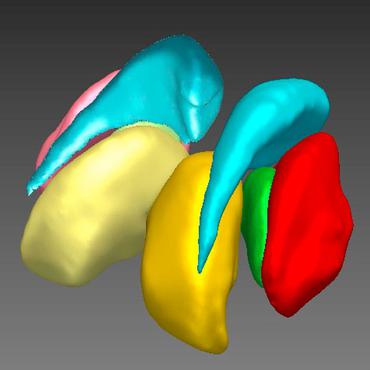Search Results for author: Mostafa Mehdipour Ghazi
Found 12 papers, 1 papers with code
Data Augmentation-Based Unsupervised Domain Adaptation In Medical Imaging
no code implementations • 8 Aug 2023 • Sebastian Nørgaard Llambias, Mads Nielsen, Mostafa Mehdipour Ghazi
Deep learning-based models in medical imaging often struggle to generalize effectively to new scans due to data heterogeneity arising from differences in hardware, acquisition parameters, population, and artifacts.
Deep Learning-Based Assessment of Cerebral Microbleeds in COVID-19
no code implementations • 23 Jan 2023 • Neus Rodeja Ferrer, Malini Vendela Sagar, Kiril Vadimovic Klein, Christina Kruuse, Mads Nielsen, Mostafa Mehdipour Ghazi
Cerebral Microbleeds (CMBs), typically captured as hypointensities from susceptibility-weighted imaging (SWI), are particularly important for the study of dementia, cerebrovascular disease, and normal aging.
FAST-AID Brain: Fast and Accurate Segmentation Tool using Artificial Intelligence Developed for Brain
2 code implementations • 30 Aug 2022 • Mostafa Mehdipour Ghazi, Mads Nielsen
A novel deep learning method is proposed for fast and accurate segmentation of the human brain into 132 regions.
Learning spatiotemporal features from incomplete data for traffic flow prediction using hybrid deep neural networks
no code implementations • 21 Apr 2022 • Mehdi Mehdipour Ghazi, Amin Ramezani, Mehdi Siahi, Mostafa Mehdipour Ghazi
This study focuses on hybrid deep neural networks to predict traffic flow in the California Freeway Performance Measurement System (PeMS) with missing values.
CARRNN: A Continuous Autoregressive Recurrent Neural Network for Deep Representation Learning from Sporadic Temporal Data
no code implementations • 8 Apr 2021 • Mostafa Mehdipour Ghazi, Lauge Sørensen, Sébastien Ourselin, Mads Nielsen
Learning temporal patterns from multivariate longitudinal data is challenging especially in cases when data is sporadic, as often seen in, e. g., healthcare applications where the data can suffer from irregularity and asynchronicity as the time between consecutive data points can vary across features and samples, hindering the application of existing deep learning models that are constructed for complete, evenly spaced data with fixed sequence lengths.
On the Initialization of Long Short-Term Memory Networks
no code implementations • 22 Dec 2019 • Mostafa Mehdipour Ghazi, Mads Nielsen, Akshay Pai, Marc Modat, M. Jorge Cardoso, Sebastien Ourselin, Lauge Sorensen
Weight initialization is important for faster convergence and stability of deep neural networks training.
Robust parametric modeling of Alzheimer's disease progression
no code implementations • 14 Aug 2019 • Mostafa Mehdipour Ghazi, Mads Nielsen, Akshay Pai, Marc Modat, M. Jorge Cardoso, Sébastien Ourselin, Lauge Sørensen
Different M-estimators and logistic functions, including a novel type proposed in this study, called modified Stannard, are evaluated on the data from the Alzheimer's Disease Neuroimaging Initiative (ADNI) for robust modeling of volumetric MRI and PET biomarkers, CSF measurements, as well as cognitive tests.
Training recurrent neural networks robust to incomplete data: application to Alzheimer's disease progression modeling
no code implementations • 17 Mar 2019 • Mostafa Mehdipour Ghazi, Mads Nielsen, Akshay Pai, M. Jorge Cardoso, Marc Modat, Sebastien Ourselin, Lauge Sørensen
The proposed LSTM algorithm is applied to model the progression of Alzheimer's disease (AD) using six volumetric magnetic resonance imaging (MRI) biomarkers, i. e., volumes of ventricles, hippocampus, whole brain, fusiform, middle temporal gyrus, and entorhinal cortex, and it is compared to standard LSTM networks with data imputation and a parametric, regression-based DPM method.
Robust training of recurrent neural networks to handle missing data for disease progression modeling
no code implementations • 16 Aug 2018 • Mostafa Mehdipour Ghazi, Mads Nielsen, Akshay Pai, M. Jorge Cardoso, Marc Modat, Sebastien Ourselin, Lauge Sørensen
This paper shows that built-in handling of missing values in LSTM network training paves the way for application of RNNs in disease progression modeling.
Combining Multiple Views for Visual Speech Recognition
no code implementations • 19 Oct 2017 • Marina Zimmermann, Mostafa Mehdipour Ghazi, Hazim Kemal Ekenel, Jean-Philippe Thiran
In this paper, we explore this aspect and provide a comprehensive study on combining multiple views for visual speech recognition.
Visual Speech Recognition Using PCA Networks and LSTMs in a Tandem GMM-HMM System
no code implementations • 19 Oct 2017 • Marina Zimmermann, Mostafa Mehdipour Ghazi, Hazim Kemal Ekenel, Jean-Philippe Thiran
Automatic visual speech recognition is an interesting problem in pattern recognition especially when audio data is noisy or not readily available.
A Comprehensive Analysis of Deep Learning Based Representation for Face Recognition
no code implementations • 9 Jun 2016 • Mostafa Mehdipour Ghazi, Hazim Kemal Ekenel
Deep learning based approaches have been dominating the face recognition field due to the significant performance improvement they have provided on the challenging wild datasets.







